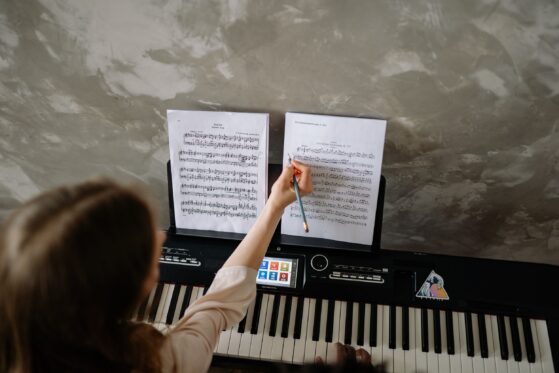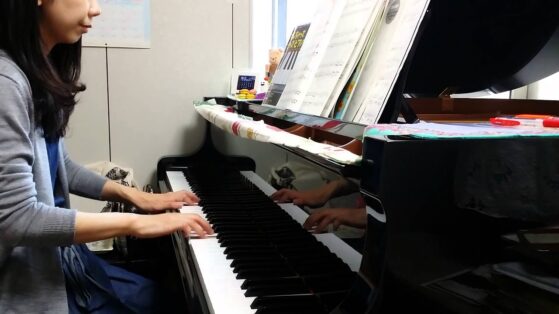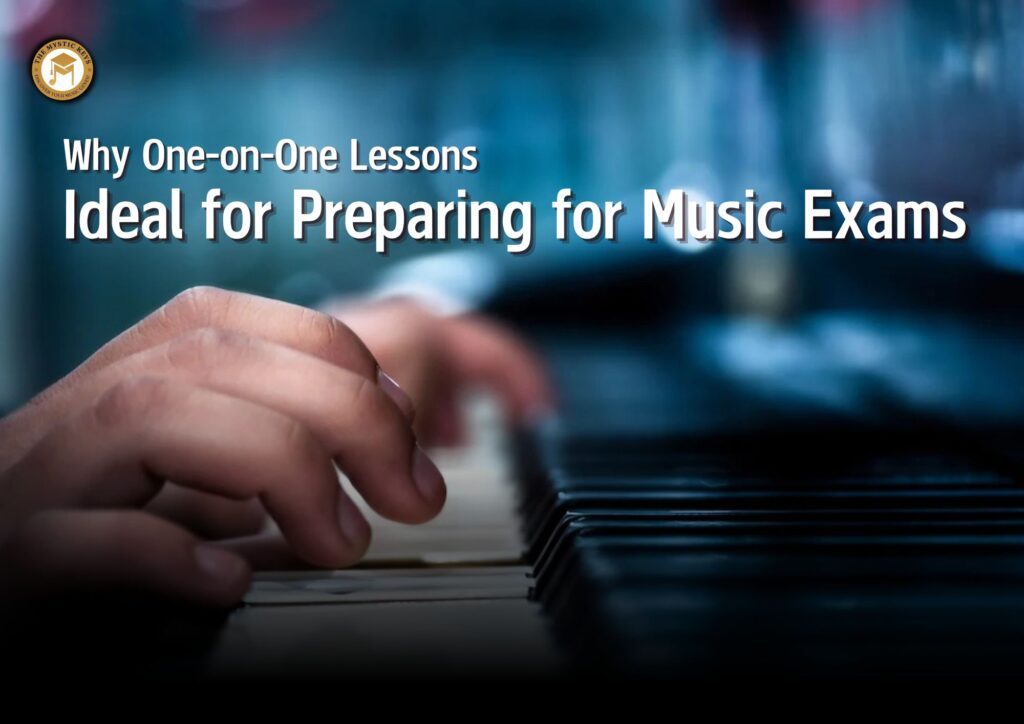Why One-on-One Lessons Are Ideal for Preparing for Music Exams ?
When it comes to preparing for music exams, students often face the daunting task of mastering both technique and theory in a relatively short period. While group classes may offer a sense of community, one-on-one lessons have emerged as the gold standard for exam preparation. These personalized lessons are ideal for tailoring the learning experience to the individual’s specific needs, abilities, and learning styles, ensuring the student receives the best possible preparation for their music exam.
In this blog, we will delve deep into why one-on-one lessons are not only beneficial for exam preparation but also essential for optimal growth as a musician. Let’s explore how they can give students the advantage they need to succeed in their music exams.

Personalized Attention to Detail
In one-on-one lessons, the student’s unique needs take center stage. Unlike group lessons, where the instructor has to divide their attention among multiple students, one-on-one sessions allow the teacher to focus entirely on the student’s progress. This dedicated attention ensures that every aspect of the student’s technique, interpretation, and performance is thoroughly addressed.
For example, if a student is struggling with a specific passage or is unsure about a musical phrase’s articulation, the teacher can spend as much time as needed to work through these issues. This individualized feedback helps to correct mistakes early on and fosters faster progress. In contrast, a group setting may not afford the time or opportunity for such focused, constructive attention.

Tailored Learning at Your Own Pace
Everyone learns differently, especially when preparing for music exams. While some students may grasp new concepts quickly, others might need more time to understand complex topics. One-on-one lessons cater to each student’s individual pace, making them especially beneficial for mastering difficult pieces or concepts required for exams.
For instance, a student who needs more time to master music theory or scales can work at their own pace. The instructor can adjust the lesson plan to meet their evolving needs, ensuring steady progress. This flexibility prevents students from feeling rushed or overwhelmed—two common pitfalls in group settings where the instructor must move at the pace of the entire class.

Addressing Weaknesses and Building Strengths
One of the most significant advantages of private lessons is the ability to identify and address specific weaknesses. During one-on-one sessions, the instructor can evaluate the student’s overall performance and pinpoint areas that need improvement. Whether it’s timing, fingering technique, sight-reading, or expression, these weaknesses can be worked on intensively with a strategic approach.
Conversely, strengths are nurtured and further developed. Teachers can use the time spent in these lessons to challenge students to reach new heights in their musical abilities, ensuring that every aspect of their exam material is prepared to perfection. A good instructor will know exactly how to tailor exercises and practice strategies to help students overcome their obstacles and maximize their potential.

Immediate Feedback and Correction
A key advantage of one-on-one lessons is the immediate feedback students receive. In a group setting, there may be a delay in receiving constructive criticism, especially if multiple students are performing at the same time. However, in a private lesson, students are able to receive instant feedback on their performance. This is crucial during exam preparation, where small details can make a significant impact on the overall performance.
Immediate correction allows students to understand their mistakes in real time and adjust their technique accordingly. Whether it’s altering posture, improving phrasing, or correcting tempo, immediate feedback prevents students from ingraining bad habits, which can be difficult to unlearn as they progress.

Customized Practice Schedules
When preparing for a music exam, consistent practice is essential. However, not all students have the same practice needs. Some may require extra time on scales, while others might need additional work on pieces or theory. One-on-one lessons give instructors the ability to create customized practice schedules tailored to the student’s specific goals and time frame.
This personalized approach to practice ensures that the student is not overwhelmed by too much content at once. It also prevents students from wasting valuable practice time on areas they’ve already mastered, allowing them to focus on the aspects that will make the most impact on their exam results.

Building Confidence for Exam Day
Preparing for music exams involves more than just technical practice; it also requires managing psychological challenges. Many students feel anxiety or nerves, which can harm their performance. One-on-one lessons provide a safe space for students to build confidence and overcome these challenges.
Instructors give continuous encouragement, constructive feedback, and mock performances. This helps students gain the self-assurance needed to face exams with poise. By understanding each student’s strengths and weaknesses, instructors guide them to focus on positive aspects, boosting their morale and fostering a positive mindset for the exam.

Mastery of Exam Requirements
Each music exam is structured around specific requirements and expectations. One-on-one lessons ensure that the student is fully prepared to meet these demands. Whether it’s a graded exam with scales, sight-reading, and a prepared piece or an advanced level exam that includes oral and aural tests, the instructor can guide the student through each aspect of the exam.
The teacher can focus on exam-specific preparation, including selecting the right pieces for the student’s level, helping with exam techniques, and offering advice on how to approach the examiners’ expectations. One-on-one lessons can also be used to simulate exam conditions through mock tests, giving the student a realistic experience and helping them to anticipate what to expect on the big day.

Flexibility in Scheduling
One-on-one lessons offer invaluable flexibility, especially for exam preparation. Students juggle school, extracurriculars, and other commitments, making it hard to stick to rigid schedules. Private lessons let students choose convenient times, keeping exam preparation on track without added stress.
This flexibility also applies to lesson length and frequency. Some students schedule more sessions closer to exams, while others opt for longer lessons to cover complex material. Teachers adjust plans to suit each student’s needs, ensuring steady progress. These personalized adjustments make it easier for students to focus, stay consistent, and feel confident as exam day approaches.

Individualized Exam Strategy
Preparing for a music exam involves more than learning the pieces. It demands a well-thought-out strategy. Each student approaches exams differently, so one strategy rarely fits all. Instructors in one-on-one lessons design personalized strategies that align with the student’s learning style and strengths.
They teach students how to manage time during the exam, memorize pieces effectively, and handle sight-reading with confidence. Instructors also help students overcome anxiety and maintain focus under pressure. They address weaknesses and build on strengths to ensure steady progress. A personalized strategy equips students with a clear advantage, enabling them to perform confidently and successfully.

Improved Musical Understanding
One-on-one lessons deepen a student’s musical understanding beyond exam pieces. Teachers focus on essential topics like music theory, history, and ear training, which play a crucial role in music exams. This broader knowledge helps students interpret music expressively and use techniques with precision.
Instructors explain the context and significance of pieces and teach advanced concepts tailored to the exam. They guide students in refining their skills and building a deeper connection to the music. By addressing both technical and artistic aspects, private lessons create well-rounded musicians who confidently tackle every part of their exam. This comprehensive approach equips students not only to pass their exams but to excel as skilled performers.

Conclusion
When you prepare for music exams, one-on-one lessons become a crucial part of your success. They provide personalized attention that directly addresses your unique strengths and areas for improvement. Private lessons allow your instructor to adjust the pace of your learning to match your needs, ensuring you’re not left behind or rushed through important material. Immediate feedback from your teacher helps correct any mistakes in real-time, preventing bad habits from forming. This kind of focused guidance is something you can’t experience in group settings, making private lessons invaluable for your exam preparation. Whether you are aiming to master a difficult piece, boost your performance confidence, or design a customized practice schedule, one-on-one lessons are your best option for thorough and effective exam preparation.
At The Mystic Keys, our experienced instructors specialize in crafting personalized lessons tailored to your individual musical journey. We understand the demands of music exams and provide the support you need, whether you are preparing for an important exam or looking to refine your overall skills. With our expert guidance, you can feel confident in your exam preparation and achieve your musical goals. Reach out to us today to learn more about our individualized lessons and take the first step toward musical success!








